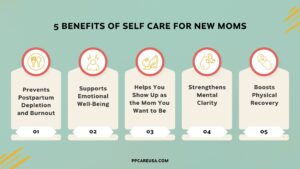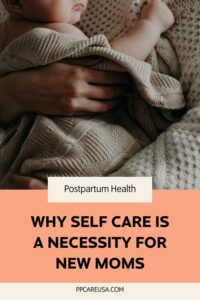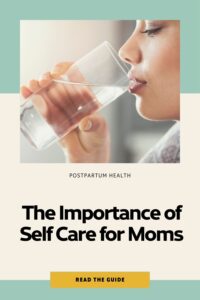Self-care for new moms shouldn’t be put on the back burner. Bringing a baby into the world is one of the most transformative experiences in a woman’s life. But while your baby is receiving round-the-clock care, who’s taking care of you?
The reality is, most new moms struggle with self-care. It’s not that they don’t want to care for themselves—it’s that between feeding, diaper changes, and sleepless nights, finding the time and energy feels nearly impossible.
But here’s the truth: Self-care is not indulgent. It’s essential. And it doesn’t have to be elaborate or time-consuming. Small, consistent habits can have a profound impact on your mental, emotional, and physical well-being.
In this guide, we’ll explore the importance of self-care for moms and give you practical self-care ideas for busy moms that take five minutes or less but make a world of difference.
Why Do Moms Struggle with Self-Care?
If you’ve found it difficult to prioritize your well-being after giving birth, you’re not alone. Here are some common reasons why moms struggle with self-care:
- Lack of time – Newborns require constant attention, leaving little room for self-care.
- Mom guilt – Many mothers feel selfish for focusing on their own needs.
- Exhaustion – Physical recovery, night feedings, and hormonal shifts make self-care feel like an added burden.
- Lack of support – Many moms don’t have a village to lean on for help.
- Societal pressure – The unrealistic expectation to “do it all” leads moms to put themselves last.
But here’s the thing: Self-care isn’t about taking time away from your baby. It’s about making sure you have the energy, patience, and well-being to care for your family in the best way possible.
The Importance of Self-Care for Moms
Neglecting self-care doesn’t just leave you feeling drained—it has real consequences on your mental, emotional, and physical health. Here’s why self-care for moms is so crucial:
1. Prevents Postpartum Depletion and Burnout
The postpartum period is already exhausting, and running on empty only makes it worse. Small self-care habits help restore energy levels and prevent long-term burnout.
2. Supports Emotional Well-Being
Motherhood is emotionally intense. Taking even a few minutes for yourself each day can reduce stress, stabilize mood swings, and prevent postpartum anxiety or depression.
3. Helps You Show Up as the Mom You Want to Be
When you take care of yourself, you become a better mom. You’re more patient, present, and emotionally available for your little one.
4. Strengthens Mental Clarity
Brain fog is real postpartum! Self-care practices like proper hydration, movement, and mindfulness improve focus and cognitive function.
5. Boosts Physical Recovery
Pregnancy and childbirth take a toll on your body. Self-care supports postpartum healing, reduces inflammation, and helps with hormone regulation.

How to Practice Self-Care as a New Mom (In 5 Minutes or Less)
Now that we know why mother self-care is so important, let’s talk about practical ways to implement it—even with a newborn.
You don’t need an hour-long bubble bath or a full spa day. Small habits, done consistently, make all the difference.
1. Physical Self-Care for Moms
Prioritizing basic physical needs can have a huge impact on energy levels and mood. Here are some quick ways to nurture your body:
- Drink a full glass of water first thing in the morning – Hydration affects everything from energy to brain function.
- Have a high-protein snack – Stabilizes blood sugar and prevents energy crashes.
- Stretch for five minutes – Releases tension, improves circulation, and supports postpartum recovery.
- Step outside for fresh air – Even a few minutes outdoors boosts mood and reduces stress.
- Practice deep breathing – Helps regulate the nervous system and reduce anxiety.
- Take a short walk – Movement releases endorphins, helping you feel more refreshed.
Pro tip: Keep a water bottle and healthy snacks by your nursing or feeding station to make hydration and nutrition effortless.
2. Mental & Emotional Self-Care
Your mental health is just as important as your physical health. Here are quick ways to care for your mind and emotions:
- Name your feelings out loud – Acknowledging emotions helps process them.
- Set a 5-minute timer for journaling – Brain dump worries, gratitude, or affirmations.
- Take a mindful pause before reacting – Helps prevent overstimulation and frustration.
- Say “no” without guilt – Protect your time and energy.
- Listen to music or a podcast while nursing or folding laundry – Keeps your brain engaged and entertained.
If you’re feeling overwhelmed, check in with yourself regularly. If your emotions feel unmanageable, don’t hesitate to seek professional support.
3. Practical Self-Care (Making Mom Life Easier)
Self-care also includes making daily life more manageable. These small changes can help lighten your load:
- Create a “reset” routine for the day – A five-minute habit (like clearing the kitchen counter) can create a sense of calm.
- Keep easy, nourishing snacks accessible – Avoids energy crashes and brain fog.
- Use voice-to-text for reminders & lists – Reduces mental overload.
- Batch small tasks together – Saves time and prevents constant interruptions.
- Accept help when offered – You don’t have to do it all alone.
Pro tip: Give yourself grace—you don’t need to have everything “figured out.” Focus on what helps you feel your best.
Making Self-Care a Habit
The best self-care plan is the one you can actually stick to. Here’s how to make self-care part of your routine:
- Start small – Pick one self-care habit to focus on first.
- Stack it onto an existing routine – Example: Drink a glass of water right after brushing your teeth.
- Track progress – Use a simple checklist or phone reminder.
- Give yourself grace – Some days will be harder than others. That’s okay!
Habit stacking is a great way to train your body and mind to incorporate self-care into your everyday routine. James Clear talks about habit stacking and it’s a great message for postpartum moms in the thick of it!
Self-Care is Not a Luxury—It’s a Necessity
New moms are often told to “just survive” the postpartum phase. But motherhood shouldn’t mean sacrificing yourself in the process.
Self-care doesn’t have to be overwhelming or time-consuming. Tiny, intentional actions add up over time. And a few months from now, you’ll be grateful you made the effort.
Take the first step today: Pick one self-care idea from this list and commit to it. You deserve it.
Need More Support?
If you’re struggling with postpartum depletion, mood swings, or exhaustion, you’re not alone. Reach out for professional postpartum support to help you feel your best.
Your health matters—because a happy, well-cared-for mom raises a happy, well-loved baby.
Pin This for Later:



Postnatal Depletion
Meet the Team
Our Services
Supplements
A virtual healthcare clinic that helps postpartum mamas recover from postnatal depletion syndrome with a holistic approach.

Get in touch